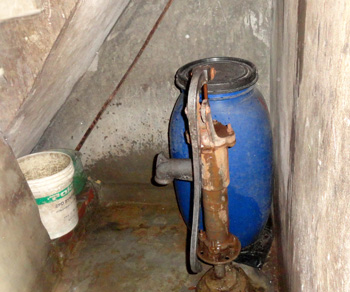
Women started to arrive one by one. As everyone arrives the chairperson begins the meeting and then Shahanaj takes over to lead the meeting. The women each contribute about 3 cents per week to a group savings fund and use that fund to take out loans to begin small income-generating activities. Shahanaj proudly lets me know that their group’s loan repayment rate is 100%!
Is it that easy for everyone to pay back? No, not always. But when someone has difficulty making their payment, the group members work together to pay back that instalment. Something stronger than money has tied them together.
Recently, this unity has helped them solve one of the biggest problems in their community. Women in the slums of Dhaka often had to line up at 3 A.M. to get water from the one and only water line available. If the water ran out before it was their turn, their family would have to go without.
While “Meghla” with its 20 female members couldn’t tackle this problem on their own, they are not alone. There are many other community groups in this slum and several groups together formed several People Institutions. These PI’s represent many people and are able to tackle larger-scale issues like the lack of access to water. Shahanaj went to her PI on behalf of the Meghla group and asked them for help on addressing the water issue. The PI realized that they’d need to solicit the help of a specific man who is politically influential. They organised the community people and together petitioned this man for help. It worked!
The politically-influential man installed a main water line to the slums from which individuals could install sub lines to their own homes. Now almost everyone has access to water. Sahanaj and Hanif could not afford to install their own water pump and line, but they could join forces with their neighbors. Together with five other families they installed one water pump. While the water pressure is low and the water isn’t safe for drinking, it provides the family with enough water for household needs.
Note: World Renew's ministry in Bangladesh is made possible, in part, by the generous support of the Canadian government's Department of Foreign Affairs, Trade and Development.
